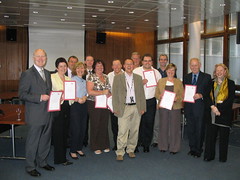Wednesday, June 29, 2005
Diplomatic Incident
Back in February I blogged about the IFPTE's attempt to secure recognition for locally engaged staff employed by the British Embassy in the USA.
Since then the campaign has had more twists and turns than a bowl of spaghetti hoops, but a couple of months ago the Embassy finally agreed to sit down and talk to the staff and their union. However, while there have since been compromises on both sides, the Embassy still refuses to collectively bargain with the union - effectively ruling out meaningful negotiation and consultation.
As a result the IFPTE have filed a complaint with the ILO - You can find more about the campaign here.
Tuesday, June 28, 2005
No proper blogging today...
Left the house at 5.10am this morning to get me into London for an 845 meeting, and now travelling back from Weston-super-mare and a meeting with the South West TUC, and so literally haven't had a minute.
As is usual when you are desperate to end a long journey the train is running 45 minutes late, so best end this post now before I come over all 'Victor Meldrew' about rail privatisation!
Monday, June 27, 2005
Do you want Stella or Boddington's with that pay-cut?
The GMB in Lancashire have called a protest meeting for tomorrow in support of suspended shop steward Gary Belshaw.
Best bit about this story is that ASDA, part of multi-national behemoth Wal-Mart, unilaterally demanded that warehouse workers in Wigan increase the number of items lifted per eight hour shift from about 1,100 to 1,400. In return management offered the forklift drivers a free crate of beer if they agreed to the increase....visions of fork-lift truck drivers careering round the warehouse after supping their 'bonus' (sic) in an attempt to meet their new targets! Can management get more inane than this?
Can anyone else offer up a more bizarre 'bonus' offer, or example of British management at its best?!
Great comment piece by Nick Cohen in yesterday's Observer about the employment practices of First Group in the US.
As he describes UK and European companies are quite happy to dump the 'European Social Model' as soon as they cross the pond.
You can find out more about the transatlantic-union campaign in First Group here.
Of course First Group aren't the only UK or European company to deny the right to representation to their US workers. A couple of years ago I visited Greenville, South Carolina, and met with some of the PR people at the BMW plant there, which didn't recognise unions. They were at pains to tell me that of course they would recognise a union if that was the choice of their workers, but the issue hadn't arisen - not surprising when union density in the manufacturing sector South Carolina stands at less than 3%, and the use of union busters is the norm. Job security and union membership are pretty much mutually exclusive in South Carolina and many of the other 'right to work' (right to union bust) states.
On my way from the airport to the town I had to share a taxi with a rather unpleasant German bloke who was visiting one of his component factories in the area (non-union - and therefore cheaper and more compliant - labour has helped attract literally hundreds of European manufacturers to SC). When he found out what I did for a living he gleefully went on to tell me how workers in SC didn't want unions, and the usual employer spiel about what a burden they were on free enterprise etc etc. Best response came not from me but from the woman who was driving the cab who looked over her shoulder, fixed him with a hard glare, and told him he was talking out of his proverbial...he didn't say another word for the rest of the journey!
Wednesday, June 22, 2005
Before entering the lions den!
TUC deputy general secretary Frances O'Grady with (l-r) Academy Organisers Lee Cash (Community), Juanita Charles (PCS) and Mick Orpin (TGWU)before today's presentation to the TUC General Council meeting.
Tuesday, June 21, 2005
Monday, June 20, 2005
I'm not too good with figures, but haven't we got a problem here?
What do you get when you combine record levels of student debt, a (still) out of control housing market desperately short of social housing, cheap credit, and the withdrawal of employer backed final salary pensions schemes...answers on a post card to the 'Lets all pray that interest rates stay in the single digits' competition...
Leaving aside the worrying long-term financial pigeons that a whole generation must fear coming home to roost, shouldn't we be just a bit concerned that one in four parents now have adult children living at home?
Thursday, June 16, 2005
Certificates!
The 2004/2005 Leading Change group. L-R, Paul Noon Prospect, Mary Bousted ATL, Brendan Barber TUC, Ginka Toegel LSE, Mark Dickinson NUMAST, Christina McNea UNISON, Joe Morgan GMB, me, Tim Poil NGSU, Manuel Cortes TSSA, John Kelly Birkebeck College, Mary Howard NASUWT, Noel Dowling SIPTU, Alison McGarry TUC
In London today for the 2nd module of this year's Leading Change programme, which is a training and development programme for senior union officers.
Good end to the the day as there was an informal reception which brought together this years Leading Change participants with last year's group (see photo above).
The best bit about the Leading Change programme is it gives union officers a bit of time and space to talk about some of the big strategic challenges facing unions; including the challenges we face internally to make sure our own structures reflect the changing world of work; the changing needs of our members and prospective members; and attempts by some employers (both crude and sophisticated) to marginalise unions or keep their workplace union-free.
Trick now is to find the answers to these challenges!
Wednesday, June 15, 2005
When I grow up I want to be a....
Train driver? Astronaut? What, you mean you didn't want to be a union organiser??!!!
Spent the morning with the TUC Organising Academy, listening to their presentations about the work they had done during the year. Pretty refreshing to hear some positive stuff for a change!
The Academy Organisers this year have worked on a whole range of campaigns from 'bookies' to low-cost airlines, big non-union telecom's firms to civil servants.
If you are interested in becoming a union organiser its not to late to sign up for a TUC Organising Academy Development Centre.
Tuesday, June 14, 2005
A bit about me, vol 4:
I love the summer...longer days, a beer or five in the garden, fishing (found time to do this for the first time in 14 years this weekend), and an excuse for overweight English men to get away with wearing shorts (with socks, sandals and tight fitting football shirt natch!).
On the down side there's hay fever - and you really have to be a sufferer to know how bad it can be. Non-sufferers think that hay fever is sort of a made up complaint, something to reassure hypochondriacs when its not flu season, but as a sufferer for 32 years I can honestly say there's nothing worse (well ok I know there is, but a bit of hyperbole never hurt anyone!).
Sniffily, Paul...
If the Economist is writing about it you can tell me theres trouble brewing...(Sorry no link because its a subscription only article.)
Brothers at arms - A row in the labour movement
America's trade unions are in a rut. They are at last having a proper debate about their future
'We will not be a rubber stamp of the Democrats'. That was the pledge of John Sweeney shortly after he was elected boss of the AFL-CIO, back in 1995. Ten years later, the trade-union federation, which represents 13m workers, looks more than ever like an adjunct of the Democratic Party. It gives no hard money to any party, because it is not allowed to; but it routinely endorses individual Democrats in elections; it mobilised 250,000 people in a massive get-out-the-vote drive for John Kerry last year; and it has waged a fierce campaign against President George Bush's plan to reform Social Security.
Meanwhile, union membership has continued to slide. Today, a mere 12.5% of the workforce belongs to a union, compared with over one-third of workers in the 1950s. Much of this has to do with the decline of the heavily unionised manufacturing sector, but the labour movement has also been slow to react. On Mr Sweeney's watch, it has lost nearly 800,000 members. And there is grumbling in the ranks about the movement's priorities.
Andy Stern, the feisty boss of the service workers' union, the biggest and fastest-growing in the movement, says Mr Sweeney has poured too much money into politics. The $44m political budget for the past two years (a number which excludes staff) should have been spent on increasing the size of the movement. Only when unions get bigger, goes the argument, will they be able to sway policy.
Mr Stern has threatened to bolt from the AFL-CIO unless the unions that do the most organising get a 50% rebate. He is also pushing John Wilhelm, who represents hotel workers, to challenge Mr Sweeney. The latter is up for re-election at the AFL-CIO convention in July.
Mr Stern met with four rebel bosses this week in Las Vegas to plot strategy. They are cross that Mr Sweeney plans to increase the political budget to $60m (again not counting staff salaries). The extra cash will go on setting up a year-round field operation to lobby all levels of government. Mr Sweeney has doubled the budget for organising to $22.5m, but the rebels would rather spend $65m. Mr Wilhelm calls the $7.5m earmarked for organising at target companies, such as Wal-Mart and Federal Express, 'radically insufficient'.
Nevertheless, many union barons are rallying around Mr Sweeney. That is partly because they object to Mr Stern's pushiness. But they argue that organising cannot be separated from politics. For public-sector unions in particular, politics is crucial. In many states, collective-bargaining rights for state employees are granted by the governor. When Republican governors came into power in Missouri and Indiana last year, they promptly tore up orders granting such rights.
It is not hard to see why the public-sector unions want to fight Mr Bush. By outsourcing jobs to private contractors, he has trimmed the federal payroll. Citing national security, he has rolled back the collective-bargaining rights of thousands of workers in the Department of Defence. And he has all but banned transport-security workers in the Department of Homeland Security from unionising.
Many private-sector unions also fear the administration. The Department of Labour has issued a new rule requiring them to disclose the purpose of expenditures above $5,000. And the unions complain that the National Labour Relations Board (NLRB), the federal agency that governs union elections and arbitrates union-employer disputes, is stacked against them. It banned Brown University graduate students from organising last year. Now the unions think it will limit 'card-check' , a somewhat dubious system where a union gets most of the workers at a firm to sign a pledge card and thus avoids NLRB-supervised secret-ballot elections.
Some union leaders think the labour movement ought to support a few token Republicans; but only a few more, and not very conspicuously. Mr Stern baffled the barons last year when he gave $570,000 to Patrick Ballantine, a Republican challenger for the governorship of North Carolina who had promised pay rises for state workers. 'He's playing into the Republicans' hands', says Leo Gerard, president of the steelworkers' union.
But is Mr Stern really so wrong? The unions' current Democratic strategy has plenty of political drawbacks. It means the Democrats take them for granted, moderate Republicans do little to help them and they have to endure the wrath of conservatives like Mr Bush. It also plainly goes against many of their members' interests. One in three unionists voted for Mr Bush last year; many of them are traditionalists who do not like to see their money going, however indirectly, to support abortion choice or gay marriage. 'We need to get across that this is a movement that believes in faith and individual rights', admits Harold Schaitberger, the head of the firefighters' union.
On the other hand, it is hard to see how mending fences with Republicans would help the unions stem their decline. In many southern and western states they face 'right to work' laws, which allow workers to opt out of joining. (Elsewhere, workers are forced to pay dues to the union if a majority of the workers vote to have one.) Ever more workers nowadays are part-timers, who are harder to organise. And as Richard Hurd of Cornell University points out, businesses are sophisticated at shutting unions out. Tactics include avoiding the hiring of rabble-rousers (something Wal-Mart is accused of) and dividing people into teams, which bolsters morale and makes complainers unpopular.
These tactics appear be to working. Despite rising inequality in wages, job satisfaction is quite high. And without a brewing sense of injustice, it is tough to get workers to rise up against their bosses.
Friday, June 10, 2005
Tracking technology means workers are 'loo'sers...
Sorry for awful pun - story here about companies using sophisticated tracking technology to time how long their employees spend in the loo. Progress eh?
Of course the technology may be more sophisticated, but this is not a new phenomenon. About 10 years ago I used to work for Manpower on a BT contract, and we were supposed to key in a particular code if we left our work-station to 'use the facilities' (re-reading this it looks like I'm going for a bit of a record here on toilet euphemisms).
We usually 'forgot' to put in the right code, or even better starting raising our hand and asking the supervisor if, 'Please sir/miss, can I use the toilet...I really need to go!'. Supervisors can normally deal with outright opposition, but mockery is a whole different ball game...suffice to stay the 'toilet regime' ended pretty shortly thereafter!
Thursday, June 09, 2005
A bit about me, Vol 3:
For some reason 2 and a bit years ago I managed to persuade my wife Vicky that what we really needed on top of 3 kids, a house move and a 200 mile commute was a dog.
'Scooby' (picture to be posted) was the result. He's lovely (sort of), but frankly makes a bit of a mockery of the Kennel Club's claim that Schnauzers are 'Alert, reliable and intelligent'. He is the only dog I've ever known that walks into lamposts (as he's dragging me down the road chasing HGV's). Mind they do claim that pets take on the characteristics of their owners....
Thanks to my impressive dog training skills he often takes anywhere up to an hour to come back if he's let off his lead - a problem exacerbated by the fact that I literally have to walk round the park shouting 'Scooby Doo...where are you!'
Wednesday, June 08, 2005
Blog Nowak has been off the air for the last few days as I've been out and about all over the place.
On Monday I was part of a TUC team that went to the DTI to talk about, amongst other things, the upcoming review on facilities and support for union reps. Yesterday I was at the GMB Congress up in Newcastle, and I'm currently in sunny south Wales to meet the Wales TUC and Nick Ireland, USDAW's Divisional Officer.
Normalish service will be resumed once I've drawn breath...
Sunday, June 05, 2005
Give me a 'W', give me a 'A'....(no this isn't going where you think it is!)
Guardian report of Wal-mart's shareholders meeting, which brought together Bon Jovi, Will Smith and 20,000 shareholders and staff to the 'Bud Walton' arena in Arkansas. Reni Liefenstahl eat your heart out, this is how corporate America does bombast!
Thought the 2 saddest parts of the article where the description of 200 ASDA employees who were clapped into the stadium wrapped in 'union' flags (stars and stripes not GMB!)... And 'Don Tuxhorn, from Mishawaka, Indiana, who said he had had a "blast" all week. "The enthusiasm is unbridled. I work for the best company in the world without a doubt. Some people don't like us because we win. '
No Don, the reason people don't like you is because Wal-Mart are virulently anti-union, damaging for local communities and exploit suppliers in the developing world.
I used to work in ASDA many years ago when the then wannabe Conservative MP Archie Norman was boss - and was pocketing millions in share options,while insisting that everyone in ASDA called each other 'colleague' (although obviously some colleagues were more equal than others!).
Even before Wal-Mart took over the company there were clear efforts to marginalise the union (example - Why join a union when you can join the ASDA Law club? All your legal worries taken care off, just please don't try and use this service for employment related matters....).
You can find out more about Wal-Mart here.
Friday, June 03, 2005
And the losers are...
British workers, their families and communities.
Latest installment in the 48 hour working week saga - which reinforces the point I made the other day that its hard to see how people can play more of a role in their local community when they are already struggling to balance home-life with increasing working hours.
Wednesday, June 01, 2005
Guilty pleasures...
No not the title of a dodgy 1980's Alistair Campbell article for 'Hustler', but a list of things I know are wrong, but can't help enjoying anyway.
Prompted to start this list after I cracked at the weekend and started reading (and worse enjoying) 'The Dogs of War' by the caring, sensitive, liberal that is Frederick Forsyth. For those who haven't read it, its a formulaic, pro-imperialist, border-line racist account of a British mining company's attempt to overthrow an African dictator. It's also unputdownable!!!
In my defence I had literally nothing else to read, it was bank holiday Monday and I had the choice of 'The Dogs of War' a couple of old Mills and Boons and a Barbara Cartland (all second hand) in the camping-site shop at Hendre Mynach.
So here's my top 5 list of guilty pleasures - post yours in the comments section!
No 1: The BeeGees - at full blast with the car window firmly wound up.
No 2: Oh its not just Frederick Forsyth, have to admit I've even enjoyed the 'odd' Jeffrey Archer (is there any other sort?)
No 3: Brown Sauce....on anything and everything.
No 4: McDonalds, Burger King et al - fast food in general really. Bad for the environment, usually non-union, everything that's wrong with today's homogenised, consumerist world - but great for placating the little 'uns, and an extremely effective hangover cure.
No 5: Er that's it...run out of imagination and honesty now!
David Miliband in the Guardian today, speaking about the need for people to engage more in their local community.
Its actually quite a good article and David Miliband is clearly one of the more insightful and thoughtful cabinet ministers. I met him a couple of times while working for the TUC in the North East - and while his politics clearly differ from mine on lots of issues, there is no doubting he's a pretty capable bloke.
That said, I'm sceptical about some of the thinking underpinning 'new localism'.
One of the clear barriers to more people getting engaged in their local communities is the increasing amount of time they have to spend work.
The TUC has just published research covering this problem, and exposing some of the myths around working time that the CBI and others like to peddle to justify UK workers putting in more hours than most of their counterparts across Europe.
Its clear that at the bottom end of the wages scale long hours are the only way that many people can bring home a half decent pay-packet; at the other end, corporate culture generally means that those working long hours are seen as more 'committed' and somehow more productive.
I'm also sceptical about what added value the 'business class' can bring to 'local coalitions' - another point picked up in the article. While I can see that there are lots of private sector firms who'd gladly help deliver local public services or infrastructure projects, I'm pretty sure that these are more likely to be driven by profit than a Victorianesque notion of wider civic duty.
Maybe I'm being too cynical, but its hard to see the likes of Jarvis, Capita et al, queueing up to do good works in exchange for little more than a brass plaque and a few words of thanks in the local paper!










